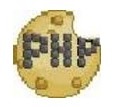abstract
This article contains handful PHP function ae_put_cookie for easy cookie setting and "Cookie Notepad" example which allow visitor to store text in his own browser cookie.
compatible
Cookie is a parcel of text sent by a web-server to a web-browser and then sent back unchanged by the browser each time it accesses that server. (– Wikipedia definition)
PHP has a function setcookie since version 3.0, but this function is too low-level for simple usage.
Function ae_put_cookie below, sets cookie for current domain (removing ‘www’ subdomain to ensure that cookie will be accessible to top-level domain):
source code: php
<?php
function ae_put_cookie($name, $value, $days=0)
{
$cookie_host = preg_replace('|^www\.(.*)$|', '.\\1', $_SERVER['HTTP_HOST']);
if (substr(strval($days), 0, 1) == 'f')
$exp = 2147483640;
else if (substr(strval($days), 0, 1) == 'r')
{
$exp = 1; $value = '';
}
else if ($days != 0)
$exp = time() + intval($days)*86400;
else
$exp = 0;
setcookie($name, $value, $exp, '/', $cookie_host);
}
?>
This first and second argument is this function is name and value of cookie, passed directly to setcookie function. Third argument may have one of the following values:
- argument not specified (or zero): the cookie will be set as session cookie, so it will expire when user closes web-browser
- positive integer: number of days before cookie will expire. If today is 5th of September and third parameter equals to 10, cookie will expire at 15th of September.
- any string beginning with ‘f’, like word ‘forever’ — cookie will stay at user’s browser forever (~ till 2038 year)
- any string beginning with ‘r’, like word ‘remove’ — cookie will be removed
Here is an example, ‘Cookie Notepad’ which allows to store entered text as a cookie and edit it later:
source code: php
<?php
error_reporting(E_ALL); // high level of error reporting
// copy-paste function ae_put_cookie here from above
if (strtolower($_SERVER['REQUEST_METHOD']) == 'post')
{
if (isset($_POST['notepad']))
{
$days = isset($_POST['days'])?$_POST['days']:'';
ae_put_cookie('notepad', $_POST['notepad'], $days);
header("Location: http://{$_SERVER['HTTP_HOST']}{$_SERVER['PHP_SELF']}");
}
}
?>
<html><head><title>CookieNotepad</title></head>
<body>
<?php
if (!isset($_COOKIE['notepad']))
echo "<b>Cookie for notepad is not set</b><br>";
?>
<form action="<?=$_SERVER['PHP_SELF']?>" method="post">
Text:<br>
<textarea rows="10" cols="60" name="notepad">
<?php
if (isset($_COOKIE['notepad']))
{
// escape HTML tags and entities
$s = str_replace('&', '&', $_COOKIE['notepad']);
$s = str_replace('<', '<', $s);
$s = str_replace('>', '>', $s);
echo $s;
}
?></textarea>
<br>
Third argument for ae_put_cookie:<br>
<input type="text" name="days" size="10"><br>
(empty - session cookie, 'f' - forever, 'r' - remove, integer > 0 - number of days in future)
<br><br>
<input type="submit" value="create/save">
</form>
</body>
</html>
tested
http://www.anyexample.com/programming/php/php_cookie_example.xml
